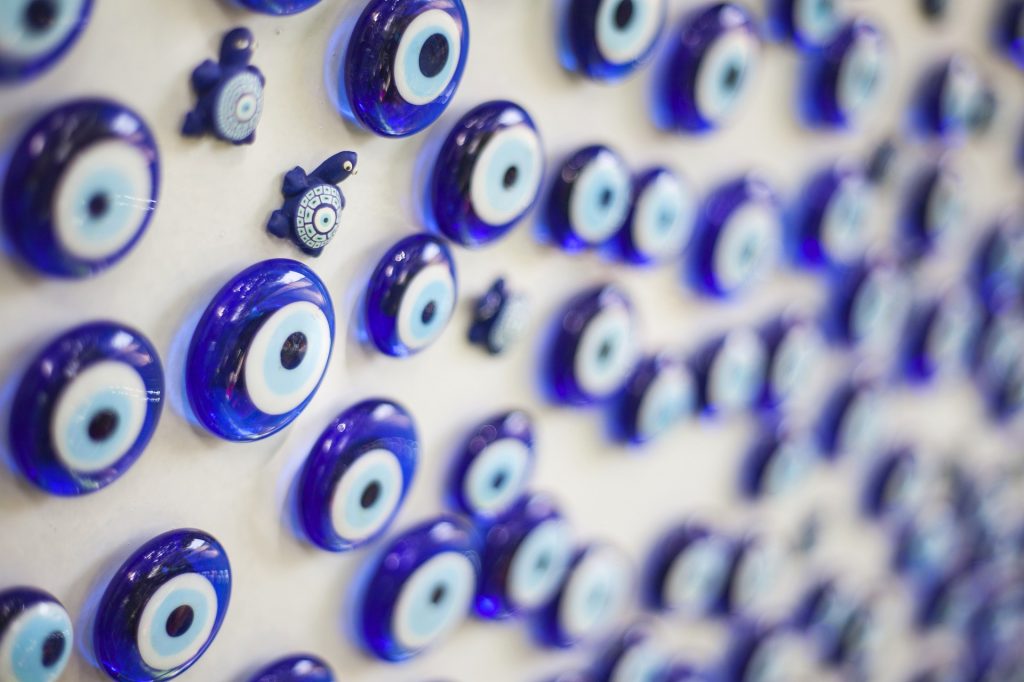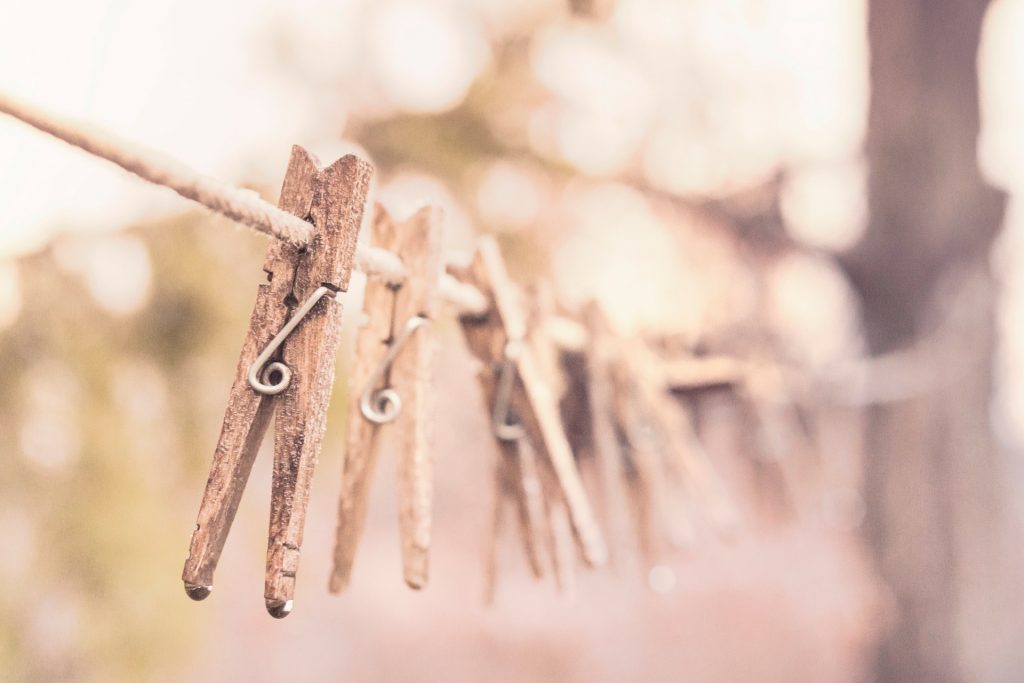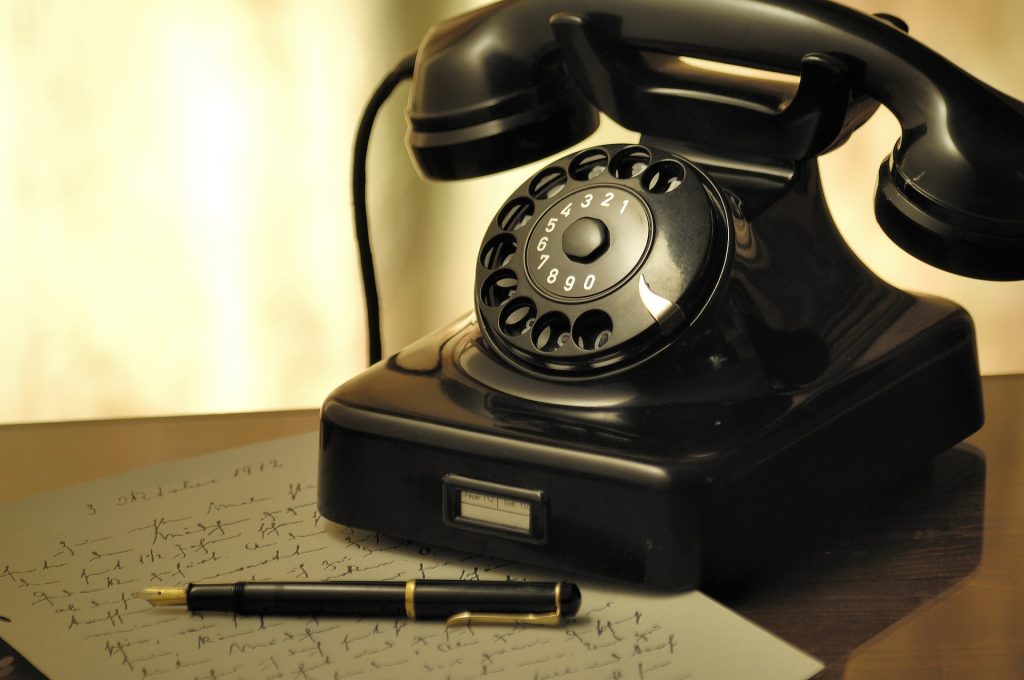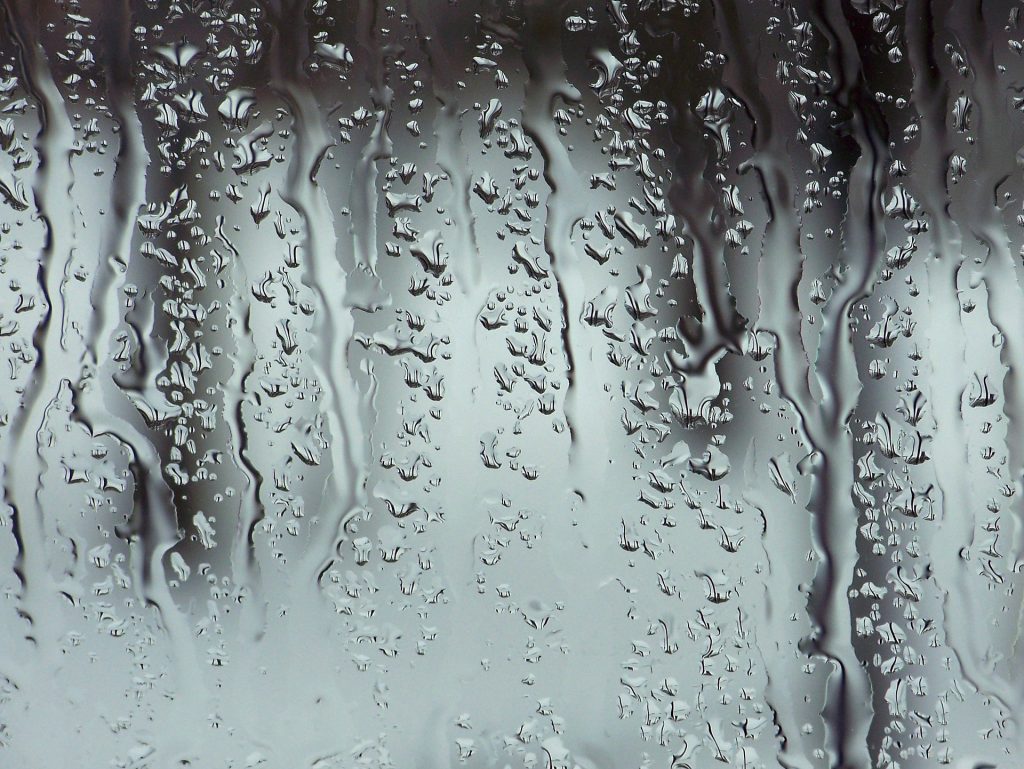I reached the town of Köşk (population 9,900) early on Tuesday, 4 September. It was only 10:45 a.m. I had planned to spend the night here, but since it was so early I decided to keep walking right through it. Besides, I was learning that towns that large were too big for walkers like me.
Once I got through Köşk and had a broader view of my surroundings, I noticed the Menderes River valley beginning to narrow. In about four days I would begin the week-long climb onto the Central Anatolian plateau. Reaching that plateau would be a significant milestone for me. It would mark the end of the beginning. I would be well on my way and probably thinking that at some point I would finish this walk.
East of Köşk I found an evil eye charm on the shoulder of the road. The evil eye, known in Turkish as the nazar boncuğu, is a Mediterranean good luck charm that stares back at jealous spirits and wards their bad energy away from anyone who might be even remotely admired or known. I had meant to pick one up in İstanbul, but I got distracted and forgot. I leaned down, picked up the charm, and tied it to my pack, where I planned to keep it all the way to the other side of the country. My sunglasses were no longer the only piece of equipment I’d found lying on the side of the road.

The road that day had a very wide shoulder. But in Turkey a wide shoulder is not a safe place to walk, it’s an extra lane to drive in when traffic is heavy or when tractors need a place to drive during harvest. Trucks also use them and one whizzed by me every couple of minutes. One of them even swerved toward me intentionally. Maybe the driver was bored and this was just his form of entertainment. He missed me by only a couple of feet. To have a semi trying to see how close it can get to you as it passes is a scary thing to have happen.
I’d learned from living in Turkey that when there is an open space you take it. But in the three years I’d been back in the US preparing for my trek by walking on the side of the country roads near Reedley, California, I’d forgotten that rule. There, people generally didn’t drive on the shoulders. So, once back in Turkey, I had to remind myself, Okay, you need to remember the local habit now or you’re going to die before you reach the fence bordering Iran, evil eye or no.
I stopped at a restaurant for a lunch of kaşarlı köfte (cheesy meatballs). The cook knew who I was and how long I’d been on the road. He’d seen me in the paper, he said.
Towards the end of the day I started looking for a place to sleep, but was having a hard time finding one. The first village I rolled into was more like a wide spot in the road, and there were barely enough people to support a bakkal. However, I was tired and I wanted to stop for the day, so I tried it anyway. I spotted a tea garden by the side of the road. I walked up and sat down for tea, took off my sunglasses, and tried to make eye contact with the people at the nearby tables. No one would meet my gaze though, and when I finally did catch someone’s eye it was the waiter’s.
He walked over to me, leaned toward me, and said before I could introduce myself, “Maybe you better just move on to the next village.” I did take that personally, figuring that I was probably smelling pretty ripe.
How did he know I wasn’t just there to order tea, I asked myself. I grudgingly stood up, shouldered my pack, and hit the road again.
As the late afternoon shadows grew long, I pulled off the road into Sultanhisar, a small town of 10,000 people in the eastern half of the Menderes River valley. There, I rested in the mosque garden for a bit before resuming my search for a place to stay.
A handful of people at the mosque told me that there was very memorable scenic camping at a set of ruins a couple of kilometers up one of the hills. I had heard about these ruins before — in fact, a number of people had recommended them to me in the past.
I climbed up the hill with my 45-pound pack, even though it was an extra 4 kilometers at the end of the day. I had hoped to be finished walking by then. But I was looking forward to getting to the top. The site had been described to me as bucolic, ancient, and silent, and as having a great view. As I climbed, I thought about how I had made good progress in the last few days, and if I liked the campground I might stay at it an extra day. I had peaceful visions of hanging my laundry out to dry against a backdrop of ancient ruins, looking out over the valley below, sipping tea and feeling content.

There were guards at the gate, however, who told me camping was forbidden there. Tired and frustrated, I told the guards the people in Sultanhisar below had said there was plenty of camping up here. The guards just said, “They don’t know what they’re talking about.”
Dejected, I hiked back down the hill and back into town. I returned to the mosque’s garden and sat for a few moments wondering what to do. There was no hotel in Sultanhisar and daylight was burning.
Across the street I saw the city headquarters and a sign above the door: “Mayor’s Office.” Sweaty, dirty, and wearing my backpack, I entered the mayor’s office and told the staff in the front office that I would like a place to stay in Sultanhisar that night but couldn’t find a place, and I told them about being refused entry at the “camping place” up on the hill. The person at the reception desk took one look at me and quickly ushered me into one of the back offices. Someone else came to the back office and said, “Follow me.” I followed this person into the mayor’s office. The mayor was on the phone — actually on two phones at the same time, looking very busy.
I took my backpack off and sat in the overstuffed leather couch in his office, leaning forward so my sweaty back wouldn’t stick to the leather behind me. The attendant who had brought me into the room asked me if I wanted a glass of water. I said, “Yes, thank you very much,” trying my best not to seem too eager.
When he finished his phone calls, the mayor pushed back from his huge oak desk, introduced himself to me, and shook my sweaty, dirty hand. I repeated my story to him and asked if he could help me find a place to stay. We chatted for a few minutes to get acquainted. Then he got on the phone again and made a call.

“I’ve got a yabancı here passing through. Can you find him a place to stay tonight?” He spoke Turkish very quickly and I didn’t quite get everything he said, but when he hung up he looked at me smiling. “I’ve found you a place to stay,” he said. “Go with that guy over there.” He pointed to an assistant standing in the doorway, and then picked up one of the phones, since they were both ringing again.
The assistant drove me across the village in a beat-up Toyota to the city’s vehicle maintenance yard. “Is this where I’m staying tonight?” I asked. “Yes, it is,” the assistant said.
I was happy to be assigned any place with a horizontal surface where I could stretch out and sleep, so it was fine with me that the mayor had arranged for me to stay at a maintenance yard that housed the village’s stock of vehicles — a couple small buses, a snowplow that probably got used once every 20 years, and a couple garbage collection trucks.
The workers at the maintenance yard were very friendly and hospitable to me, a stranger who appeared suddenly. They invited me to use the yard’s office, which had a soft couch I could sleep on, making it the first time in a week I wasn’t on a hard surface (even at the imam’s house I had been on the floor). There were no lights in the office, but there were electrical outlets where I could charge my phone and computer. It was quiet. There was running water. I washed three of my shirts and hung them out to dry.
After I’d settled in, the mechanics on the night shift invited me to join them for a dinner of pide and ayran. After dinner, we sat around the table drinking çay and discussing the tensions building in Syria. At 8:30 p.m. I went inside to sleep on the soft couch.
The next morning my alarm went off at 6 a.m., waking me from a deep sleep. I had been dreaming. The last time I remembered dreaming was a week before in Kuşadası. It was hard to believe I had left İstanbul only a week before. I had been walking four days and four nights. It seemed a lot longer. I brushed my teeth, washed my face, and pulled on a freshly-washed shirt. This would be my fifth day walking, and I had not showered in those five days. I hoped to find a cheap hotel or a hostel in Nazilli, that day’s destination, where I could celebrate the end of Week 1 by taking a steaming hot shower.

Before beginning the day’s walk, I ate a breakfast of simit (a round bagel-like roll covered with sesame seeds) and çay with Mehmet Bey, a dolmuş driver who would be driving the same route I would be walking.
I left the vehicle maintenance yard and walked 3 kilometers to the main road. A few hundred meters into the day’s walk, I stopped to pull out my notebook and write the following note:
Things I learned this week:
- Wash shirts at every stop, one at a time so they can dry while hanging from your backpack.
- Mosques are great places to wash and rest up. They are like truck stops, but with religion.
- Things I need to learn: How to shower more regularly.
—
In 2012, Matt sold off or gave away almost everything he owned. He strapped whatever was left to his back, flew to Turkey, and walked across it. Every foot, from one end of the country to the other. Along the way he slept in mosque gardens, dined with strangers, and stumbled into refugee camps.
This is the story of that journey. We’ll be publishing one chapter each week from his book. If you would like to read the whole thing at once, you can purchase his book titled Heathen Pilgrim: Walk Across Turkey on Amazon.









